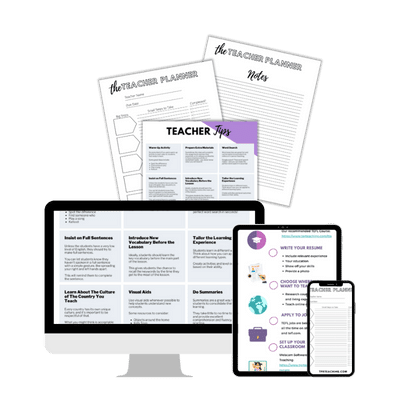First day of class? Have a new group of students and want to break the ice?
When we start a new class, we will likely want to introduce icebreaker questions and activities.
This breaks the tension and helps the students become acquainted with each other and the lessons.
Let’s look at some of the best ESL icebreaker questions and activities that can be incorporated into the classroom:
1. Small Talk
You can get to know ESL students by asking them questions and encouraging them to speak about random topics. This is a simple icebreaker yet an effective one.
Some potential questions you could ask them:
- What do you like to do in your free time?
- What languages do you know how to speak?
- Have you ever lived in a different country?
- What was the last movie you saw?
- What is your talent?
2. Have You Ever…?
You can ask the students “have you ever” questions. Students like to talk about themselves and their experiences. Students also get to practice the present perfect.
For example:
- Have you ever met a celebrity?
- Have you ever won a trophy?
- Have you ever been on TV/the radio?
- Have you ever played a musical instrument?
- Have you ever run a marathon?
- Have you ever locked yourself out of the house?
- Have you ever had to go to the hospital?
3. Would you rather…?
You can also ask students “would you rather” questions. This activity works well with students who know how to use the conditional structure, making it a perfect icebreaker for advanced students.
For example:
- Would you rather be able to take to animals or speak many foreign languages?
- Would you rather it rained cats or dogs?
- Would you rather be invincible or be able to stop time?
- Would you rather have no homework or no tests?
- Would you rather be a pirate or be a ninja?
- Would you rather be rich or find love?
Find more Would You Rather” questions here.
4. Find Someone Who…
This is an excellent introductory icebreaker you can play with students.
For example, you can ask students to find someone who…
- Has traveled to the most countries
- Has attended a language school before
- Has a dog
- Has an interesting hobby
- Was born in August
- Plays a musical instrument
Give the students time to find someone in the class who fits the description and ask the students for their answers at the end.
You can find many exercise sheets at ISL Collective.

5. Ball Toss ESL Icebreaker
This icebreaker can be used for groups of kids or adults. All you need is a lightweight ball, like a beach ball.
Form a circle. You can ask a question and throw the ball to a student. The student answers the question and asks a question before throwing the ball to another student.
Encourage them to form a different question to ask the next student. If they are a lower level, they can ask the same question.
You can also give the students a topic or grammar pattern to encourage them to ask different questions.
6. Group Therapy
If you have teens or adults, you might like trying to ask the students to share their fears about learning English.
Students can share the skills they are lacking or what they find difficult.
This can help build a supportive, helpful classroom environment. You can also use an example of your own language learning struggles.
It would also be a good idea to ask students why improving their English is important and what goals they are trying to attain.
These personal questions will help keep them focused and reinforce why they joined the English class in the first place.
You may also be interested in: 19 ESL Warm Up Activities (Simple and Fun)

For English Language Teachers or Those Looking to Get Started…
Teacher tips, new teacher checklist, teacher planner, and notes. Subscribe for ESL News, jobs, and more!
7. Superlative Icebreaker Questions
Adding superlatives is a great way to create more exciting and engaging icebreaker questions. It can reveal a great deal more about the students. Superlative questions can include words like the best, the worst, the funniest, the most important, the oldest.
- What is the best present you have ever received?
- What is your earliest childhood memory?
- What adjectives best describe you?
- What is the scariest situation you have ever been in?
- How old is the oldest thing in your wardrobe?
Find more superlative questions here.
8. Twenty Questions
Give the students a category, like “food.” Students ask the teacher twenty questions to try to find out what food they are thinking of.
This also works for larger classes. You can put the students in smaller groups or pairs, and they have to try the icebreaker game with each other.
9. Two Truths One Lie
We can get the students talking with “two truths one lie.” Students think of three statements about themselves, one of which is a lie.
The other students have to guess which statement is a lie. This can be played in small groups and is a great icebreaker that involves literally no preparation.
You may also be interested in: Best Free ESL Worksheets for Kids
10. Deserted Island
Tell the students they will be trapped on an island for a year, and they can only take five things with them.
On the deserted island, they can already find monkeys, coconut trees, freshwater, and fish.
Students think about what five things they bring and why. They must explain the importance of the items to the class.

11. Riddles
You can ask the students to solve some popular riddles, such as the “Chicken, Fox and Corn” riddle.
Put the students in groups of three to four, so they can figure out the riddle and bounce ideas off each other.
12. “Facts About You” Paper Airplane Activity
Students write four or five facts about themselves on a piece of paper. If they are creative, they can make it into a paper airplane.
Everyone should fly their paper airplanes to the middle of the room. Students pick up the paper airplane that landed nearest them.
Students take turns reading the facts on their page and try to guess who wrote it.
You can also tailor this activity based on what topic or grammar point you are studying.
13. “Where are you from” Map ESL Icebreaker
If you have students from many different countries in a class, this could be a good ESL icebreaker to try!
Give students two pushpins each. One student can go up to the map. The other students may guess their home country and where they would like to visit.
If they are at a higher level, you could get them to use modal verbs in their answer and phrase their guesses as statements rather than questions. For example, “Lucinda might be from Spain” or “Maria probably chose Ireland because her great grandparents are from there.”
14. Four Corners
Four Corners is an icebreaker for intermediate and advanced level students. This is an effective exercise in getting the students to know each other more and provides great conversation practice in a short space of time.
Label the corners of the room one through four.
Ask getting-to-know-you questions, such as “what is your favorite food?” Give students four options– one is chicken curry, two is pizza, three is steak, four is hamburger.
Other possible questions:
- “What is your favorite music?”
- “What is your favorite job?”
- “What is your favorite sport?”
- What is your favorite color?
Student moves to the corner that best represents them. This helps the students find things they have in common and develops relationships.
15. Speed Dating Icebreaker
For speed dating, you can arrange the chairs in two lines facing each other so that students can talk together in pairs.
Introduce an icebreaker question and give students a minute to answer. The students from one line should move up a seat, so they are facing a new partner.
Keep going until the student is back facing their first partner, or you run out of time.
This introduces some real-world conversation and builds students’ confidence as they get to know each other.
16. Ice Breaker Jenga
Jenga is a super fun game to play. You can also incorporate it into your ESL classroom for an interesting ESL icebreaker.
Write an icebreaker question on each block. When the students pull a block, they have to answer whatever question is on it.

17. Student Bingo
This ESL icebreaker requires a little preparation, but it is a great game that can be used year on year. This is similar to Find Someone Who, except it is a little more competitive.
Prepare some bingo boards or cards and write phrases on the boxes such as:
- Likes football
- Speaks three languages
- Has a big family
- Has been to London
The students have to get five squares boxes in a row before they can call bingo.
Other Random ESL Icebreaker Questions:
Simple questions for younger students and beginners:
- What do you like?
- How old are you?
- What grade are you in?
- What color do you like?
- What food do you like?
- What sport do you like?
- What is your favorite book?
- What is your favorite game?
- What is your favorite animal?
- What season do you like best? Why?
- What is your favorite holiday?
- What TV show do you like?
- Why are you learning English?
- Do you have any brothers and sisters?
- What do you learn at school?
- What do you do every day?
- Do you have any pets?
- What do you do at the weekend?
- When is your birthday?
- What is your favorite kind of ice cream?
- Where does your mum work? Where does your dad work?
- What do you play with your friends?
List of icebreaker questions for teens and adults who are more advanced speakers:
- What are your hobbies?
- When was the last time you laughed so much you cried?
- What is your earliest childhood memory?
- Have you ever met someone famous?
- What would you do if you won five million in the lotto?
- Have you ever lived in a different country?
- If you could live anywhere, where would it be and why?
- Describe your dream house.
- What actor would play you if they made a movie about you?
- What is your favorite chore? What is your least favorite chore?
- Who annoys you most?
- What is a funny movie you saw?
- What movie have you seen most recently?
- Would you describe yourself as a quiet or loud person? Why?
- Why are you learning English?
- What job would you like to have? Why?
- Would you like to be famous? Why/ why not?
- If you had three wishes, what would you wish for?
- If you could buy anything right now, what would it be?
- What types of music do you like or dislike?
- If you had more free time, what would you do?
- How much sleep do you usually get?
- What risks have you taken in life?
- What do you do when you feel demotivated?
- What crime is common in your country?
- What kind of dreams do you have?
- What will shopping be like in the future?
In Conclusion
An effective icebreaker should help students open up and help them get to know their fellow classmates.
There are tons of icebreakers an ESL teacher can add to the lessons to keep students engaged and ready for class.
The games above should give you many ideas for your next class!
What ESL icebreaker questions or games do you incorporate into your lessons? Let me know in the comments section!
Useful Links
- Best ESL Job Boards for Teachers
- 17 Important Tips for New TEFL Teachers
- Best Free ESL Worksheets for Beginners
- Best Free ESL Worksheets for Adults
- Best Free ESL Worksheets for Kids
Online Teacher Toolkit
Be IN The Know
Get the latest jobs, news, and opportunities delivered directly to your inbox by joining my exclusive community. Grab my teacher planner, teacher checklist and tips now. Sign up here.
GEt Certified
Start your teaching journey and get certified now. Watch my YouTube video about how I got started, or read about my experience here: The TEFL Academy review.
START Your First Teaching JOb
New to the world of online teaching or just want to fill some hours in? Curious if this is a career you want to pursue? Check out Cambly to get started. Read the Cambly review.
Highest-Paying Online Teaching Jobs
In my post, I cover a list of some of the highest-paying online teaching jobs. Alternatively, use the curriculum online and find your own students. It’s easier than you think!
ACCEPT PAYMENTS ONLINE and Save money
Use Wise to accept payments from overseas. Wise has the lowest exchange rates that I am currently using right now. Get Wise.
Caitriona Maria is an education writer and founder of TPR Teaching, crafting inspiring pieces that promote the importance of developing new skills. For 7 years, she has been committed to providing students with the best learning opportunities possible, both domestically and abroad. Dedicated to unlocking students' potential, Caitriona has taught English in several countries and continues to explore new cultures through her travels.


